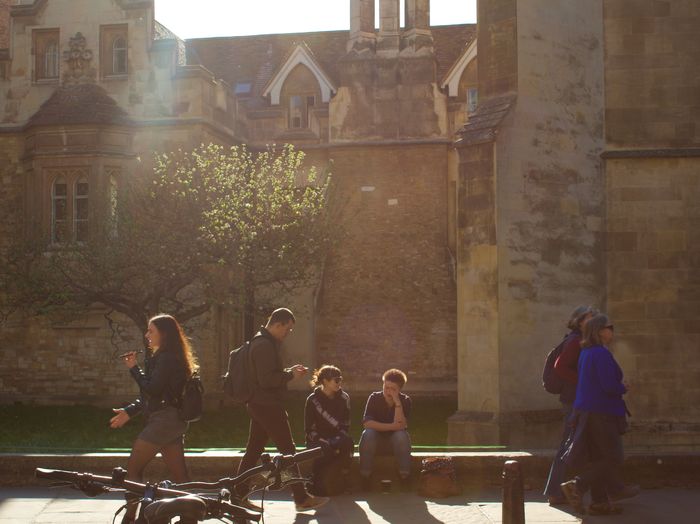‘I assumed you were stupid when I heard your voice’: does ‘accentism’ exist in Cambridge?
With clear regional disparities in Cambridge’s student population, Varsity spoke to northern students about accents, regionalism and life outside of the M25

A stand-out memory from my Freshers’ Week at Cambridge was the mention of the dreaded imposter syndrome. Whilst discussion centred on avoiding the 'monster' of self-doubt, there was very little about where it came from. Did my accent contribute to a sense that I was sticking out like a sore thumb?
I set out to find if other students felt the same. "Accentism", can be understood as unfair or even discriminatory behaviour based on someone's accent. The term made headlines last year, after Labour's deputy leader Angela Rayner hit out at critics of her Mancunian accent.
One Natural Sciences student I spoke to expressed similar concerns, suggesting that they felt other students took them less seriously upon hearing their voice and even “feeling ignored in practicals." Other students cited familiar incidents, having been asked questions such as “are you the access case?” and “is it true that the whole of the north is poor?” If this is the impression that Cambridge students have of the north, is it any wonder that the further away you move from London, the fewer northern students apply?
“Is it true that the whole of the north is poor?”
This is where accentism meets classism. When I told people that I would be going to the University of Cambridge, they were proud, of course, but I was met with words of warning, too. In my view, to my northern family there was a sense that an institution like Cambridge could only ever tolerate and not fully accept me. Others told me it was my responsibility to represent ‘girls like me’. I’m honoured, but the role of ‘Cambridge’s token Wool’ is not one I auditioned to play.
It's no wonder that northern students represent one of Cambridge's biggest outreach targets. In 2021, just 14.6% of students hailed from the north. In contrast, 48.3% came from Greater London and the South East. Is this disproportionate picture is explained by student experiences in Cambridge?
In more subtle cases, accentism is unconscious, playful even. Students interviewed by Varsity laughed about southerners repeating their pronunciation of certain words back to them, or otherwise imitating them. For many, this is a harmless joke.
One first-year at Robinson admitted that they don’t feel that their accent affects their experience very much, another from North Yorkshire said: “I take it as a compliment [because] it reminds me of where I’m from and that I won’t lose that.”
“I have to tone down my accent when I’m at uni for people to understand me”
A student from Liverpool noted that accentism is especially prevalent in Cambridge’s comedy and drama scene, with “distasteful jokes” and bad impressions furthering the feeling of alienation. “You wouldn’t do a poor impression of me in regards to my queerness as that would be in poor taste, so why is it okay to do it with my accent?”, she questioned.
Present in almost all of my interviews was the acknowledgement that northern dialects are somehow impossible to comprehend. A student from the north-east commented: “I have to tone down my accent when I’m at uni for people to understand me and I just wish we didn’t have to.” Another student noticed that they “dropped the lingo” while at university. A third year student commented that "sometimes I forget that I have an accent, I only really remember when I'm trying to work out why someone isn't taking me seriously or is being patronising. Then I have to decipher what their issue is with me: my accent, my gender, how I look or something else? You learn to stop caring."
What can be done to bridge the gap for northern students at Cambridge? As the University pats itself on the back for once again increasing the percentage of state school pupils accepted (up to a record of 72.5%) in the previous admissions cycle, the fact remains that about 68% of children claiming free school meals live in or above the Midlands, and these students are half as likely to achieve top GCSEs grades than their peers.
It feels as though the cards are economically and educationally stacked against northern students, so even some of the most promising prospective applicants convince themselves that they have no chance, or that the Oxbridge environment is not suited to ‘someone like them’. In my own experience, I have heard this justification on countless occasions, and the implication is clear: there is no room at an institution like this for a working-class northerner. It is not difficult to see why we feel that way, when our reaction to being imitated and insulted is met with, in the case of one first-year, the words “typical northerner.”
 Interviews / Lord Leggatt on becoming a Supreme Court Justice21 January 2026
Interviews / Lord Leggatt on becoming a Supreme Court Justice21 January 2026 Features / Are you more yourself at Cambridge or away from it? 27 January 2026
Features / Are you more yourself at Cambridge or away from it? 27 January 2026 News / Reform candidate retracts claim of being Cambridge alum 26 January 2026
News / Reform candidate retracts claim of being Cambridge alum 26 January 2026 News / Report suggests Cambridge the hardest place to get a first in the country23 January 2026
News / Report suggests Cambridge the hardest place to get a first in the country23 January 2026 News / Cambridge psychologist to co-lead study on the impact of social media on adolescent mental health26 January 2026
News / Cambridge psychologist to co-lead study on the impact of social media on adolescent mental health26 January 2026










